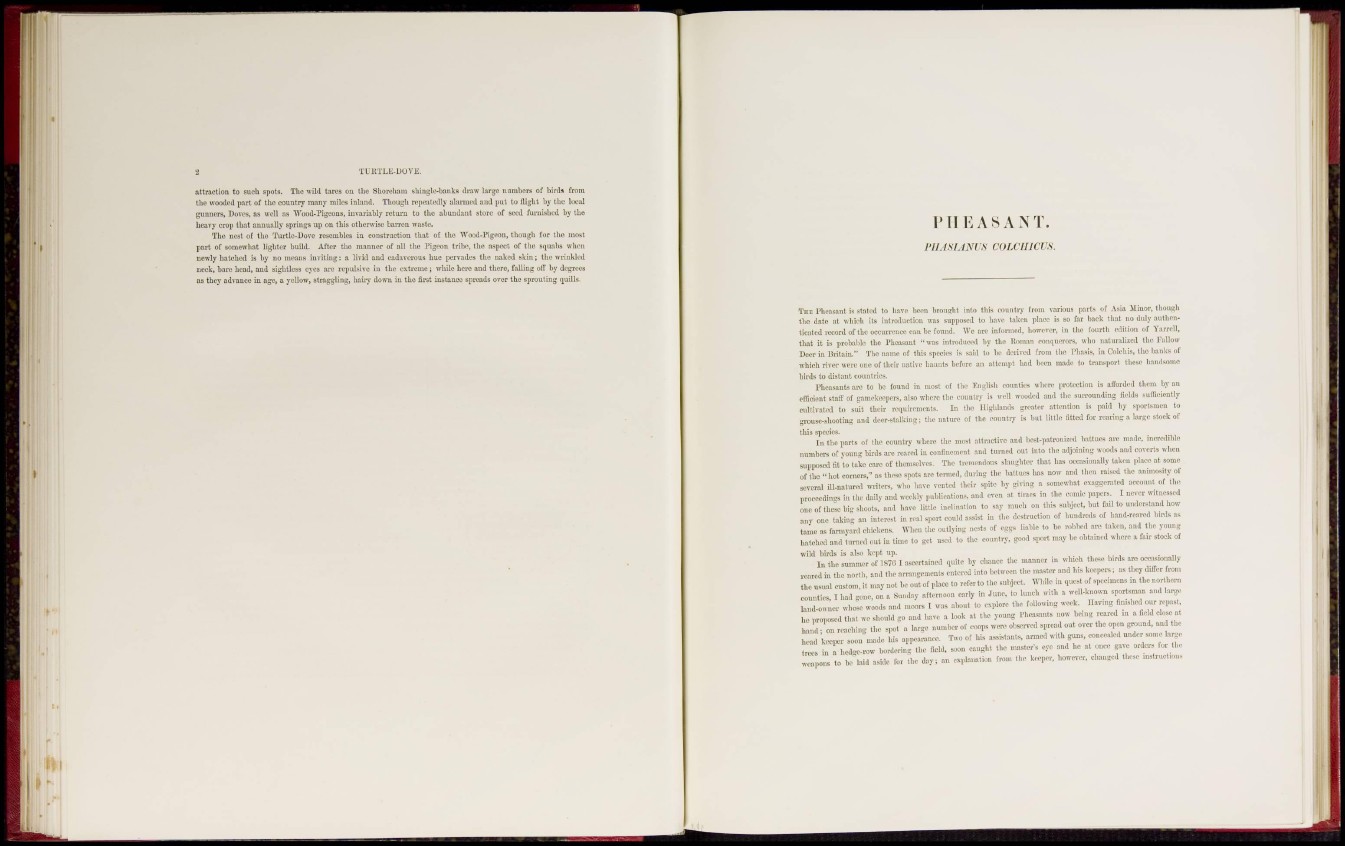
TURTLE-DOVE.
attraction to such spots. The wild tares ou llic Shorehniu shingle-banks draw large numbers of birds front
the wooded part of the country many miles inland. Though repeatedly alarmed and put to ilight by the local
gunners, Doves, as well as Wood-Pigeons, invariably return to the abundant store of seed furnished by the
heavy crop that annually springs up on this otherwise barren waste.
The nest of tho Turtle-Dove resembles in construction that of the Wood-Pigeon, though for the most
part of somewhat lighter build. After tho manner of all the Pigeon tribe, the aspect of the squabs when
newly hatched is by no means inviting: a livid and cadaverous hue pervades the naked skin; the wrinkled
neck, bare head, and sightless eyes are repulsive in the extreme; while here and there, falling off by degrees
as they advance in age, a yellow, straggling, hairy down in tho first instance spreads over the sprouting quills.
PT1 E AS ANT.
PHA8IANU8 COLCHICUS.
TIIL Pheasant is stated to have been brought into this country from various parts of Asia Miuor, though
the date at which its int reluct ion was supposed lo have taken place is so far back that no duly authenticated
record of the occurrence can be found. We are Informed, however, in the fourth edition of Yarrell,
that it is probable the Pheasant "was introduced by the Itoinan conquerors, who naturalized the Fallow
Deer in Britain." The name of this species is said to be derived from the Phasis, in Colchis, tho hanks of
which river were one of their native hauuls before an attempt had been made to transport these handsome
birds to distant countries.
Pheasants are to he found in most of the English counties where protection is ailbrded them by an
emcient staff of gamekeepers, also where the couutry is well wooded and the surrounding fields sufficiently
cultivated to suit their requirements. In the Highlands greater attention is paid by sportsmen to
grouse-shoot bag and deer-stalking; the nature of the country is but little fitted for rearing a large stock of
this species.
In the parts of the country where the most attractive and hcst-palronizisl battues are made, incredible
numbers of young birds are reared in confinement and turned out into the adjoining w..ods and coverts when
supposed fit to take care of themselves The tremendous slaughter that lias occasionally taken place at some
of the " hot corners," as these spots an' termed, during the battues lias now and then raised the animosity of
several ill-natured writers, who have vented their spite by giving a somewhat exaggerated account, of the
proceedings in the daily and weekly publications, and even at times in the comic papers, I never witnessed
one of these big shoots, and have little inclination to say much on this subject, but fail to understand how
any one taking an interest in n'al sport cuuhl assist in the destruction of hundreds of hand-reared birds as
tame as farmyard chickens. When the outlying rie-ts of eggs liable to be robbed an- taken, and the young
batched and turnrd out In time to get used to the country, good sport may be obtained where a fair stock of
w ild birds is also kept tip.
In the summer of 1878 I ascertained quite by chance the manner in which these birds are occasionally
reared in the north, and the arrangements entered into between tile master and his keepers; as they differ from
the usual custom, it may not he nut of place to refer to the subject. While in quest of specimens in the northern
counties, I had gone, on a Sunday afternoon early In June, to lunch with a well-known sportsman and large
land-Owner whose woods and moors I was about to explore the following week. Having finished our repast,
he promised that we should go and have a look at the young Pheasant n now being reared in a field close at
hand ; on reaching the spot a large number of coops were observe! spread out over the open ground, and the
bead keeper soon made his appcarauce. Two of his assistants, armed with guns, concealed under some large
trees in a hedge-row bordering the field, soon caught the master's eye and he at eiicc gave orders for the
weapons to he loid aside for the day; an explanation from (lie keeper, however, changed these instruction